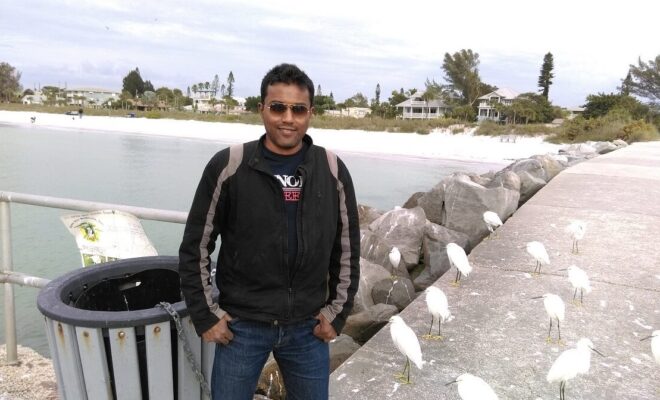Education
Abhishek Dutta, The Creator of Cyborg Cockroach That Could Potentially Save Your Life Someday, Talks About His Indian Education, Bengali Roots and More

Photo Credit: Abhishek Dutta
Abhishek Dutta, a professor at the University of Connecticut created a microcircuit that will allow more reliable and precise control of robotic insect motion.
Indian-origin scientist and professor at the University of Connecticut, Abhishek Dutta has created a roach robot also known as Cyborg Cockroach that can be instrumental in rescuing people trapped under building rubbles in future.
Dutta, who built the cyborg cockroach along with his fellow researchers in the University of Connecticut, said the robot-roach is inspired by the Madagascar hissing cockroach and this hardwired biological insect has multiple applications. “The use of insects as platforms for small robots has an incredible number of useful applications, from search and rescue to national defense,” the 38-year-old scientist said in a university statement.
Though robot roaches are not exactly a new discovery, Dutta’s cyborg cockroach comes with more control of the insect’s movement, real-time feedback of the insect’s neuromuscular response to artificial stimuli, and multi-channel avenues for stimulating the insect’s nerve tissue. The result is a more informed and precise system of control.
In an exclusive conversation with Little India, Dutta speaks about his journey in neuroscience, initial challenges in the project at the university and his Indian roots, his Boston Durga puja experience and more.
Congratulations from Little India on your breakthrough. We are always thrilled to witness science breaking yet another par to help us in a million ways. Tell us how did you get involved in this project?
My education encompassed various fields of Science and Engineering in Edinburgh, Trento, Ghent, Cambridge, and Urbana-Champaign, I had been very multidisciplinary. Though my primary focus was control systems and mechatronics, it is due to my father’s diagnosis of Parkinson’s that brought me into Neuro-engineering. And the idea to only do research that directly solves problems that millions of people face got fostered. I chose insect to be the platform for my neuro-engineering work which led to the project Cyborg Cockroach.
What were the initial challenges that you faced in the Cyborg Cockroach project?
A lot of struggles actually. Firstly, I needed to get clearance from my university to perform the experiments thereby ensuring that all the insects are dealt with the right care and protocol. Secondly, establishing a collaboration with medical/biology community turned out to be very difficult, at that point I decided to go all out by myself.
Then, I had to train my students in computational neuroscience, they came in with the knowledge of circuit design. After that, I had to establish my lab that ranges from electrical to biological setup and takes a lot of time, effort and willpower. Well, Transformative research always faces resistance.
How soon can we apply this technology in rescue operations?
At my lab, we are constantly improving the technology to make it even better right now, i.e. more capable and robust. So, it could be applied within a range of months once the results are satisfactory.
Tell us what inspires you to continue this research journey?
One has to be rounded in the knowledge of Engineering, Science, and Arts in order to achieve anything significant. I am also very passionate about music, all kinds, I like to do percussion and salsa. The very thought of helping others is deeply rooted in what I see in India. Vivekananda’s sayings and songs continue to have a profound impact on me.
Tell us about your childhood education in India?
I had a good basic education in India that was very affordable. Childhood was about the pressure of performing and a common prenotion that existed was that engineering is the need of the hour and other disciplines have no shiny future. But eventually I found out, that’s so untrue. The union of Engineering, Science and Arts are instrumental to achieve and acquire success.
Tell us about what do you do when you are not deeply buried in research?
I am big time into sports, like badminton and I love traveling.
Tell us about your Bengali roots and as Durga Puja is approaching, how is it celebrated in Boston?
There are actually five Durga Pujas around Boston! And I am really looking forward to it! Generally, it takes place in a school over the weekend. I go to give the Anjali, which is the best part for me. And then there is a special Bengali lunch and dinner which is not in the university campus though.
